
360 degree about hypothyroidism
There are Thyroid imbalances and then there's Hypothyroidism.
Now you may be wondering, what is the difference between the two?
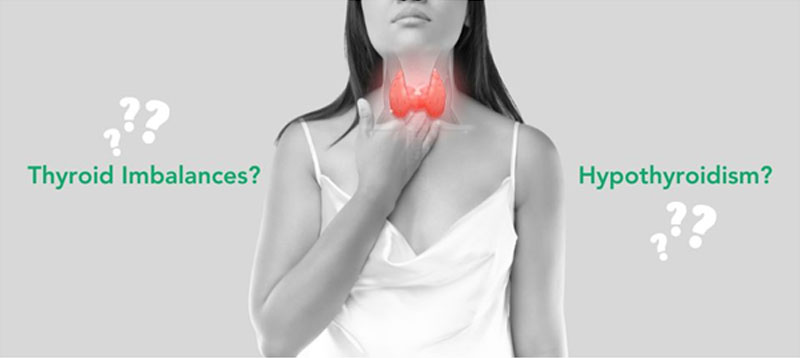
Thyroid imbalances are any disruption in the normal functioning of the thyroid gland, which plays a crucial role in regulating metabolism, energy production, and overall bodily functions.
These imbalances can manifest as either hyperthyroidism or hypothyroidism, each characterised by distinct symptoms and effects on the body.
Hyperthyroidism on the other hand, occurs when the thyroid gland becomes overactive, leading to an excess production of thyroid hormones. This can result in symptoms such as weight loss, rapid heartbeat, heat intolerance, and nervousness.
Hypothyroidism occurs when the thyroid gland is underactive, producing insufficient thyroid hormones. This can cause symptoms such as fatigue, weight gain, cold intolerance, and depression.
The key difference between thyroid imbalances and hypothyroidism lies in the specific nature of the thyroid dysfunction. Thyroid imbalances encompass a broader spectrum of thyroid disorders, including both hyperthyroidism and hypothyroidism, as well as other conditions such as thyroid nodules and thyroiditis.
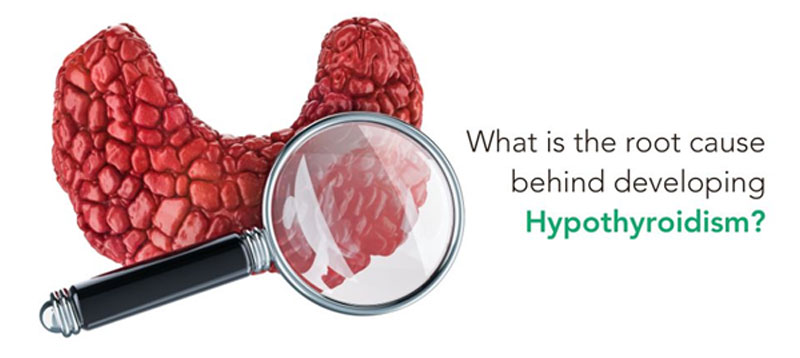
Now that we have that out of the way, let's look at what causes Hypothyroidism!
-Chronic stress: Prolonged stress can lead to dysregulation of the hypothalamic-pituitary-adrenal (HPA) axis, affecting thyroid function and contributing to hypothyroidism.
-Ageing: The risk of hypothyroidism increases with age, as the thyroid gland may become less efficient in hormone production over time.
-Pregnancy: Pregnancy-related hormonal changes can impact thyroid function, leading to gestational hypothyroidism, especially in women with pre-existing thyroid disorders or iodine deficiency.
-Environmental factors: Exposure to environmental toxins like perchlorate, found in certain water sources and food products, can interfere with thyroid hormone production and contribute to hypothyroidism.
-Genetic predisposition: A family history of thyroid disorders or specific genetic mutations can increase the likelihood of developing hypothyroidism.
-Dietary factors: Consumption of goitrogenic foods, such as cruciferous vegetables (e.g., broccoli, cabbage, kale), in large amounts can interfere with thyroid hormone synthesis and contribute to hypothyroidism, particularly in individuals with iodine deficiency.
-Viral infections: Certain viral infections, such as Epstein-Barr virus or Coxsackie virus, have been associated with the development of autoimmune thyroiditis and subsequent hypothyroidism.
-Autoimmune diseases: Other autoimmune conditions, such as type 1 diabetes or rheumatoid arthritis, may increase the risk of developing autoimmune thyroiditis and hypothyroidism.
-Pituitary tumours: Benign tumours of the pituitary gland can disrupt the production and release of thyroid-stimulating hormone (TSH), leading to secondary hypothyroidism.
-Radiation exposure: Exposure to ionising radiation, either through medical treatments like radiotherapy or environmental sources like nuclear fallout, can damage the thyroid gland and cause hypothyroidism.
-Chronic illnesses: Certain chronic conditions, such as chronic fatigue syndrome or fibromyalgia, may be associated with alterations in thyroid function and an increased risk of hypothyroidism.
-Nutritional deficiencies: Deficiencies in nutrients like selenium, zinc, and vitamin D can impair thyroid function and contribute to the development of hypothyroidism.
-Hormonal imbalances: Disorders affecting other hormones, such as cortisol or insulin, can indirectly impact thyroid function and contribute to hypothyroidism.
-Excessive iodine intake: While iodine deficiency is a known cause of hypothyroidism, excessive intake of iodine, either through diet or supplements, can also disrupt thyroid function and lead to hypothyroidism, especially in susceptible individuals.
-Smoking: Cigarette smoking has been linked to an increased risk of autoimmune thyroid disease and hypothyroidism, possibly due to its effects on immune function and thyroid hormone metabolism.

Other than these regularly known challenges, we also have specific challenges elaborated upon in scientific papers, which can further cause Hypothyroidism:
-Autoimmune Thyroiditis (Hashimoto's Thyroiditis): An autoimmune condition where the body's immune system attacks the thyroid gland, leading to inflammation and eventual hypothyroidism. (Chakera AJ, Pearce SHS, Vaidya B, BMJ, 2012)
-Iodine Deficiency: Inadequate intake of iodine, an essential nutrient for thyroid hormone synthesis, can result in hypothyroidism, particularly in regions with iodine-deficient soils. (Fuge R, Franklyn JA, Dayan CM, Thyroid, 2018)
-Thyroid Surgery or Radiation Therapy: Surgical removal of the thyroid gland or radiation therapy for thyroid cancer can result in hypothyroidism if the gland is damaged or removed. (Vanderpump MPJ, Clinical Biochemist Reviews, 2011)
-Medications: Certain medications, such as lithium (used to treat psychiatric disorders) or amiodarone (used to treat heart rhythm disorders), can interfere with thyroid hormone production and lead to hypothyroidism. (Chakera AJ, Pearce SHS, Vaidya B, BMJ, 2012)
-Congenital Thyroid Abnormalities: Some infants are born with abnormalities of the thyroid gland, leading to congenital hypothyroidism, which can affect growth and development if not promptly treated. (Alexander EK, Pearce EN, Brent GA, Brown RS, Chen H, Dosiou C, Grobman WA, Laurberg P, Lazarus JH, Mandel SJ, Peeters RP, Sullivan S, Endocrine Reviews, 2017)
-Pituitary Disorders: Dysfunction of the pituitary gland, which controls hormone production in the body, can disrupt the secretion of thyroid-stimulating hormone (TSH), leading to secondary hypothyroidism. (Chakera AJ, Pearce SHS, Vaidya B, BMJ, 2012)
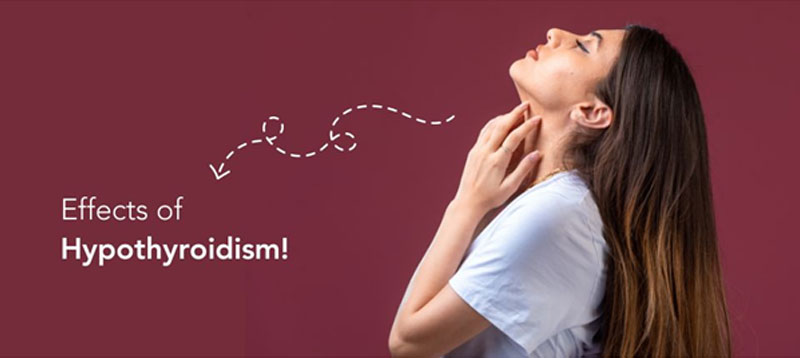
If you've got hypothyroidism or you suspect you might have it, you need to understand how it can and will affect your body-
-Weight gain: Hypothyroidism can lead to weight gain due to a slowed metabolism and fluid retention. (Vanderpump MPJ, Clinical Biochemist Reviews, 2011)
-Fatigue: Persistent fatigue and low energy levels are common symptoms of hypothyroidism, affecting daily functioning. (Vanderpump MPJ, Clinical Biochemist Reviews, 2011)
-Cold intolerance: Individuals with hypothyroidism may feel excessively cold, even in warm environments, due to a decrease in metabolic heat production. (Chakera AJ, Pearce SHS, Vaidya B, BMJ, 2012)
-Dry skin and hair: Hypothyroidism can cause dryness and roughness of the skin, as well as brittle hair and nails. (Chakera AJ, Pearce SHS, Vaidya B, BMJ, 2012)
-Constipation: Sluggish bowel movements and constipation are common gastrointestinal symptoms associated with hypothyroidism. (Vanderpump MPJ, Clinical Biochemist Reviews, 2011)
-Menstrual irregularities: Women with hypothyroidism may experience irregular menstrual cycles, including heavy or prolonged periods. (Vanderpump MPJ, Clinical Biochemist Reviews, 2011)
-Muscle weakness: Weakness and fatigue in the muscles can occur with hypothyroidism, affecting physical strength and endurance. (Chakera AJ, Pearce SHS, Vaidya B, BMJ, 2012)
-Cognitive impairment: Hypothyroidism can impair cognitive function, leading to difficulties with memory, concentration, and mental clarity. (Chakera AJ, Pearce SHS, Vaidya B, BMJ, 2012)
-Depression: Mood changes, including feelings of depression and low mood, are common psychological symptoms associated with hypothyroidism. (Chakera AJ, Pearce SHS, Vaidya B, BMJ, 2012)
-Elevated cholesterol levels: Hypothyroidism can lead to an increase in cholesterol levels, raising the risk of cardiovascular disease. (Vanderpump MPJ, Clinical Biochemist Reviews, 2011)
-Hoarseness: Changes in the voice, such as hoarseness or deepening, can occur in individuals with hypothyroidism due to changes in the structure of the vocal cords. (Vanderpump MPJ, Clinical Biochemist Reviews, 2011)
-Puffiness of face: Swelling and puffiness of the face, particularly around the eyes, may be observed in individuals with hypothyroidism. (Chakera AJ, Pearce SHS, Vaidya B, BMJ, 2012)
-Bradycardia: Hypothyroidism can lead to a slower heart rate, known as bradycardia, which may cause symptoms like fatigue and dizziness. (Vanderpump MPJ, Clinical Biochemist Reviews, 2011)
-Joint pain: Muscle and joint pain, stiffness, and swelling are common symptoms experienced by individuals with hypothyroidism. (Chakera AJ, Pearce SHS, Vaidya B, BMJ, 2012)
-Hair loss: Thinning hair or hair loss, known as alopecia, can occur as a result of hypothyroidism. (Chakera AJ, Pearce SHS, Vaidya B, BMJ, 2012)
-Slowed Heart Rate (Bradycardia): Hypothyroidism can lead to a decrease in heart rate, causing bradycardia, which may result in symptoms such as fatigue and dizziness. (Vanderpump MPJ, Clinical Biochemist Reviews, 2011)
-Anemia: Some individuals with hypothyroidism may develop anemia, characterized by a reduced number of red blood cells or hemoglobin levels, leading to symptoms like fatigue and weakness. (Chakera AJ, Pearce SHS, Vaidya B, BMJ, 2012)
-Impaired Memory: Cognitive impairment associated with hypothyroidism can manifest as difficulties with memory recall, concentration, and mental processing speed. (Chakera AJ, Pearce SHS, Vaidya B, BMJ, 2012)
-Irregular Menstruation: Women with hypothyroidism may experience irregular menstrual cycles, including infrequent periods, heavy bleeding, or prolonged menstruation. (Chakera AJ, Pearce SHS, Vaidya B, BMJ, 2012)
-Decreased Libido: Hypothyroidism can lead to a decrease in libido or sexual desire, affecting sexual functioning and intimacy. (Vanderpump MPJ, Clinical Biochemist Reviews, 2011)
-Decreased Sweating: Reduced sweating or a lack of perspiration, even during physical exertion or in warm environments, may occur in individuals with hypothyroidism. (Chakera AJ, Pearce SHS, Vaidya B, BMJ, 2012)
-Decreased Appetite: Some individuals with hypothyroidism may experience a decreased appetite, leading to unintentional weight loss or changes in eating patterns. (Vanderpump MPJ, Clinical Biochemist Reviews, 2011)
-Brittle Nails: Hypothyroidism can cause brittleness and ridges in the nails, as well as slow nail growth, affecting nail health and appearance. (Chakera AJ, Pearce SHS, Vaidya B, BMJ, 2012)
-Menopausal Symptoms: Women with hypothyroidism may experience symptoms similar to menopause, such as hot flashes, night sweats, and mood swings, due to hormonal imbalances. (Chakera AJ, Pearce SHS, Vaidya B, BMJ, 2012)
-Increased Sensitivity to Cold: Individuals with hypothyroidism may feel excessively cold, even in mild temperatures, and have difficulty staying warm. (Vanderpump MPJ, Clinical Biochemist Reviews, 2011)
So with so many different challenges and issues arising out of Hypothryoid, it may seem like a sinking ship, right?
Guess what though, there is a solution that does not involve medication.
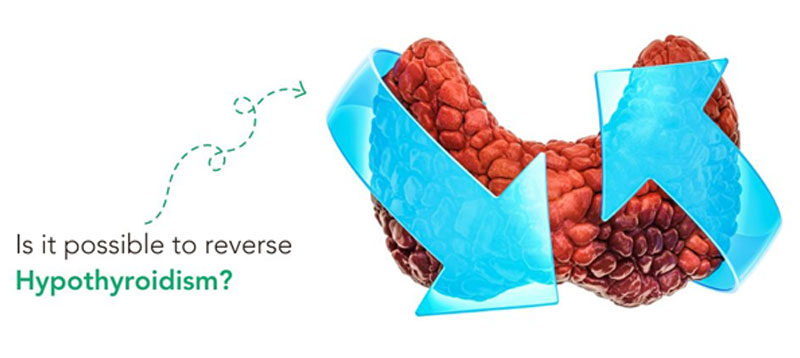 However, before we get to that, it's important to understand that hypothyroidism can not be reversed. It can be managed with proper nutrition and medication, however, it is a lifelong challenge and one has to be careful throughout their lives to ensure the effects are minimized and the damage mitigated.
However, before we get to that, it's important to understand that hypothyroidism can not be reversed. It can be managed with proper nutrition and medication, however, it is a lifelong challenge and one has to be careful throughout their lives to ensure the effects are minimized and the damage mitigated.
So, what is the solution?
As we mentioned earlier, proper nutrition can go a long way in ensuring your Hypothyroidism doesn't flare up again!
According to a scientific study, a balanced diet comprising whole foods, low glycemic index carbohydrates, lean proteins, healthy fats, and abundant fruits and vegetables is essential. Such dietary choices aid in stabilizing blood sugar levels, reducing insulin resistance, and managing weight, all of which are pivotal factors in hypothyroidism management. Thus, adhering to a well-rounded diet based on scientific recommendations can significantly contribute to preventing hypothyroidism flare-ups and promoting overall health.
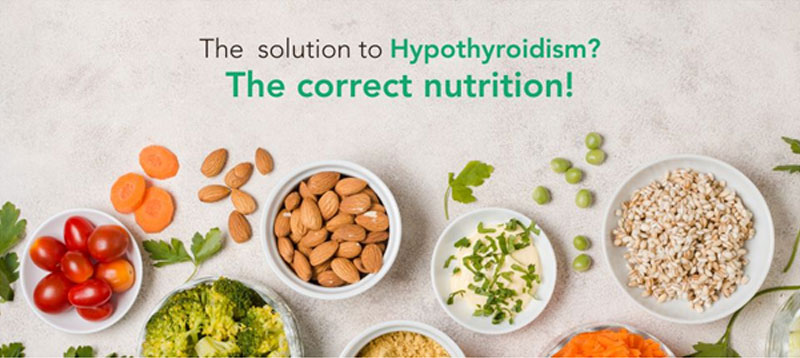
-Whole Foods: Incorporate whole, minimally processed foods like fruits, vegetables, whole grains, lean proteins, and healthy fats into your diet to provide essential nutrients and support overall health.
-Low Glycemic Index Carbohydrates: Choose carbohydrates with a low glycemic index, such as oats, quinoa, and barley, to help stabilize blood sugar levels and prevent spikes that can exacerbate hypothyroid symptoms.
-Healthy Fats: Include sources of healthy fats like avocados, nuts, seeds, and olive oil to support hormone balance, reduce inflammation, and aid in absorption of fat-soluble vitamins crucial for thyroid function.
-Lean Proteins: Consume lean protein sources such as chicken, fish, tofu, legumes, and low-fat dairy to support muscle health and promote satiety, aiding in weight management and stabilizing blood sugar levels.
-Fiber-Rich Foods: Opt for fiber-rich foods like fruits, vegetables, whole grains, and legumes to promote digestive health, prevent constipation (a common symptom of hypothyroidism), and support overall well-being.
-Antioxidant-Rich Foods: Eat foods high in antioxidants such as berries, spinach, kale, and other colorful fruits and vegetables to reduce inflammation and oxidative stress associated with hypothyroidism.
-Iodine-Rich Foods (in appropriate amounts): Incorporate iodine-rich foods like seaweed, seafood, dairy products, and iodized salt into your diet to support thyroid hormone synthesis, but be cautious not to consume excessive amounts, especially if you have autoimmune thyroiditis.
-Selenium Sources: Consume selenium-rich foods like Brazil nuts, seafood, poultry, and eggs to support thyroid hormone metabolism and protect the thyroid gland from oxidative damage.
-Vitamin D Sources: Ensure adequate intake of vitamin D from sources such as fatty fish, fortified dairy products, egg yolks, and sunlight exposure to support immune function and thyroid health.
-Iron-Rich Foods: Include iron-rich foods like lean meats, poultry, fish, lentils, beans, tofu, and fortified cereals to prevent iron deficiency anemia, which can exacerbate fatigue and weakness associated with hypothyroidism.
-Zinc Sources: Incorporate zinc-rich foods such as oysters, beef, chicken, pumpkin seeds, chickpeas, and cashews to support immune function and hormone regulation.
-B-Vitamin Foods: Consume foods rich in B-vitamins like whole grains, leafy greens, nuts, seeds, and legumes to support energy metabolism and nerve function, helping alleviate symptoms of fatigue and cognitive impairment.
-Hydration: Drink plenty of water throughout the day to stay hydrated and support overall health, as dehydration can exacerbate symptoms like fatigue and constipation associated with hypothyroidism.
-Omega-3 Fatty Acids: Incorporate foods rich in omega-3 fatty acids such as fatty fish (salmon, mackerel), flaxseeds, chia seeds, and walnuts to reduce inflammation and support hormone balance, benefiting individuals with hypothyroidism.
-Probiotic-Rich Foods: Consume probiotic-rich foods like yogurt, kefir, kimchi, sauerkraut, and miso to promote gut health and enhance nutrient absorption, which can positively impact thyroid function and overall well-being.
-Magnesium-Rich Foods: Include foods high in magnesium such as spinach, kale, almonds, peanuts, black beans, and whole grains to help regulate blood sugar levels, support insulin sensitivity, and alleviate symptoms of fatigue and weakness associated with hypothyroidism.
-Chromium-Rich Foods: Consume foods rich in chromium such as broccoli, green beans, whole grains, nuts, and seeds to help improve insulin sensitivity and regulate blood sugar levels, benefiting individuals with hypothyroidism.
-Herbs and Spices: Incorporate herbs and spices like cinnamon, turmeric, ginger, and fenugreek into your meals, as they may help improve insulin sensitivity, reduce inflammation, and regulate menstrual cycles, which can be beneficial for individuals with hypothyroidism.
-Green Tea: Enjoy green tea as a beverage rich in antioxidants and catechins that may help reduce inflammation, improve insulin sensitivity, and support overall health, including thyroid function, in individuals with hypothyroidism.
-Alternative Grains: Experiment with alternative grains such as quinoa, buckwheat, amaranth, and millet, which are gluten-free and may provide a variety of nutrients beneficial for individuals with hypothyroidism, including improved energy levels and digestive health.

Now, what foods should you eat in moderation or avoid if you have Hypothyroidism?
-Limit Goitrogenic Foods: While generally healthy, limit consumption of goitrogenic foods like cruciferous vegetables (e.g., broccoli, cabbage, kale) and soy products, especially if consumed raw, as they may interfere with thyroid function in susceptible individuals.
-Moderate Caffeine and Alcohol: Limit intake of caffeine-containing beverages and alcohol, as excessive consumption can disrupt sleep, exacerbate anxiety and mood swings, and interfere with thyroid hormone production and metabolism.
-Processed Foods: Minimize intake of processed foods high in refined sugars, unhealthy fats, and additives, as they can contribute to inflammation, insulin resistance, and weight gain, exacerbating symptoms of hypothyroidism.
-Sugary Snacks and Beverages: Avoid sugary snacks, desserts, and beverages like candies, pastries, sodas, and sweetened juices, as they can cause spikes in blood sugar levels, leading to energy crashes and aggravating hypothyroid symptoms.
-Highly Processed Meats: Reduce consumption of highly processed meats such as sausages, bacon, hot dogs, and deli meats, which may contain additives, preservatives, and unhealthy fats that can promote inflammation and negatively impact thyroid health.
-Gluten-Containing Foods (if sensitive): Consider avoiding gluten-containing foods such as wheat, barley, and rye, especially if you have gluten sensitivity or autoimmune thyroiditis, as gluten consumption may exacerbate inflammation and thyroid dysfunction in susceptible individuals.
-High-Sodium Foods: Restrict intake of high-sodium foods like processed snacks, canned soups, fast food, and salty snacks, as excess sodium can contribute to fluid retention, hypertension, and thyroid hormone imbalances in individuals with hypothyroidism.
-Artificial Sweeteners: Steer clear of artificial sweeteners like aspartame, sucralose, and saccharin, as they may disrupt gut health, alter insulin sensitivity, and contribute to metabolic imbalances, potentially worsening symptoms of hypothyroidism.
-Fried and Trans-Fat-Rich Foods: Avoid fried foods and those high in trans fats such as French fries, fried chicken, commercial baked goods, and margarine, as they can promote inflammation, insulin resistance, and cardiovascular risk factors in individuals with hypothyroidism.
-Alcohol: Limit alcohol consumption, as excessive intake can impair liver function, interfere with thyroid hormone metabolism, and exacerbate symptoms of fatigue, depression, and weight gain in individuals with hypothyroidism.
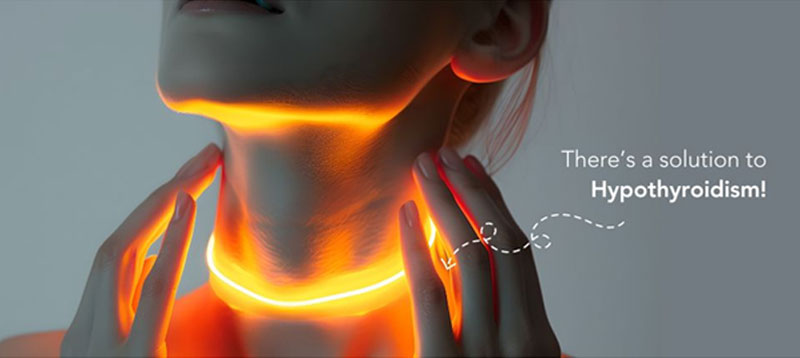
With appropriate medical treatment, including thyroid hormone replacement therapy if necessary, coupled with a balanced diet rich in nutrients supportive of thyroid health, many individuals with hypothyroidism can experience improvements in symptoms within a few weeks to a few months.
Consistency in following dietary recommendations and lifestyle modifications is essential for achieving and maintaining symptom management over the long term.
For specific timelines and personalized diet plans, we're here to help you out!
References-
https://hartfordhealthcare.org/about-us/news-press/news-detail?articleid=32994&publicId=395#:~:text=Hyperthyroidism%20is%20an%20overactive%20thyroid,and%20symptoms%2C%20sometimes%20they%20overlap.
https://pubmed.ncbi.nlm.nih.gov/21966658/
https://www.researchgate.net/publication/216838495_Subclinical_Hypothyroidism_Review_of_Concepts_and_Controversies
https://pubmed.ncbi.nlm.nih.gov/22291465/
https://pubmed.ncbi.nlm.nih.gov/25591468/
https://pubmed.ncbi.nlm.nih.gov/28056690/
https://www.ncbi.nlm.nih.gov/books/NBK285561/
https://www.healthline.com/health/high-cholesterol-symptoms
https://www.ncbi.nlm.nih.gov/books/NBK285567/
https://www.researchgate.net/publication/306254369_COMPLICATION_AND_MANAGEMENT_OF_HYPOTHYROIDISM_-A_REVIEW
https://www.researchgate.net/publication/318211343_Clinical_Profile_of_Subclinical_HypothyroidismA_Retrospective_Study
https://www.emedicinehealth.com/high_cholesterol/article_em.htm
https://www.goodrx.com/health-topic/cardiovascular/metabolic-syndrome-high-cholesterol-obesity
https://core.ac.uk/download/235664171.pdf
https://www.science.gov/topicpages/h/hypothyroidism+affects+ovarian.html
https://www.healthline.com/nutrition/hypothyroidism-diet
https://www.metropolisindia.com/blog/preventive-healthcare/optimal-nutrition-for-managing-hypothyroidism-a-guide-to-supportive-eating-habits
https://www.medicalnewstoday.com/articles/324819
https://www.forbes.com/health/nutrition/diet/best-diet-for-hypothyroidism/
https://pharmeasy.in/blog/8-best-foods-for-thyroid/
https://www.eatingwell.com/article/291531/hypothyroidism-diet-foods-to-eat-and-some-to-avoid/
https://www.eatingwell.com/article/291531/hypothyroidism-diet-foods-to-eat-and-some-to-avoid/
https://www.btf-thyroid.org/diets-and-supplements-for-thyroid-disorders